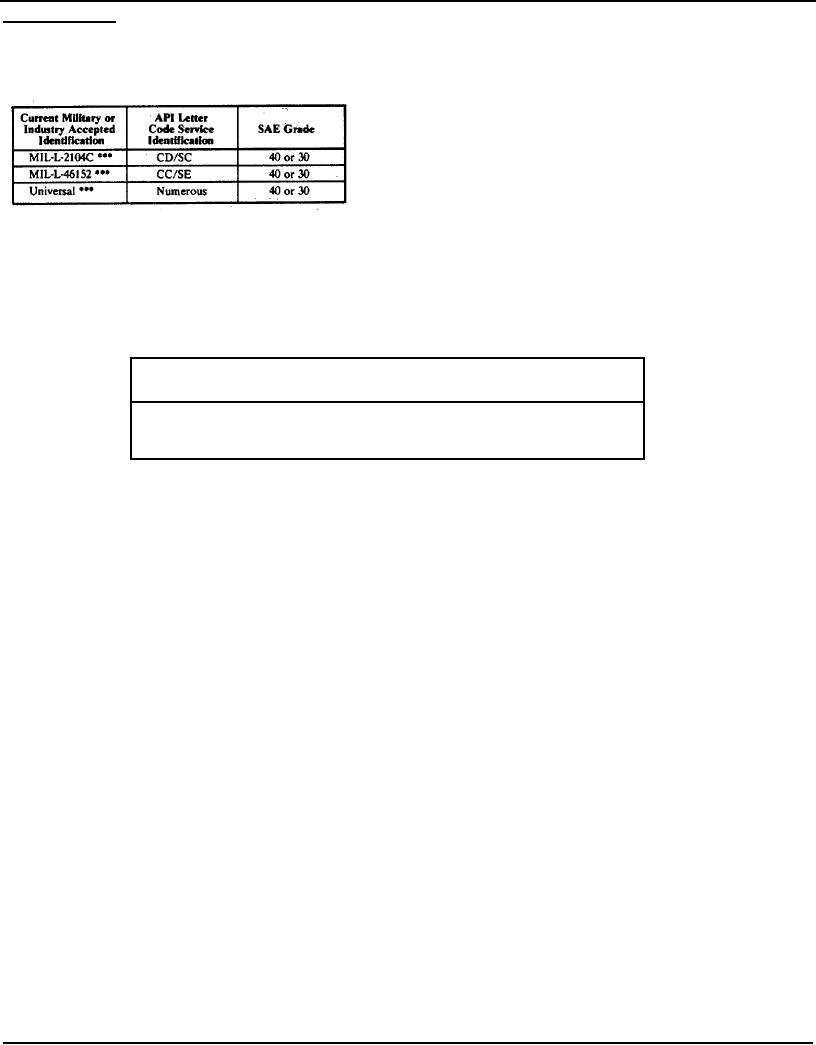
Fuel, Oil and Coolant Specifications
ZINC CONTENT
The zinc content, as zinc diorganodithiophosphate. Of all the lubricants recommended or selected as alternates for use
in Detroit Diesel engines shall be a minimum of 0.07 percent by weight. However, where EMD or RR oils are used in
marine service applications, the minimum zinc content is not required.
ALTERNATE LUBRICANT SELECTIONS
***Some lube suppliers have superseded the obsolete MIL-L-2104B
oils with either MIL-L-2104C, MIL-L-46152, or' Universal lubricants.
Generally, all of the above oil performance levels contain a higher
sulfated ash content than the older MIL-L-2104B/1964MS
lubricants. Ring belt and exhaust valve deposits are usually
greater when higher ash lubricants are used. Excessive deposit
formation in these areas may result in stuck rings and/or guttered
valves.
MIL-L-2104C. MIL-L-46152, or Universal lubricants may be used if
they meet the sulfated ash and zinc limits shown elsewhere in this
specification and sufficient evidence of satisfactory performance in
Detroit Diesel engines has been provided to the customer by the oil
supplier.
LUBRICANTS NOT RECOMMENDED
The following lubricants are NOT recommended because of a history of poor performance in Detroit Diesel engines:
Former Military or
API Letter Code
Comment
Industry Accepted
Service
on
Identification
Classification
Performance
MIL-L-2104B/1968MS
CC/SD
Excessive ash deposits formed
MIL-L45199B
CD
Excessive ash deposits formed
(Series 3)
All Multigrade Oils
Numerous
History of poor performance
MULTIGRADE OILS
Detroit Diesel does NOT recommend the use of multigrade oils. Recent investigations with some multigrade oils indicate
they do NOT, generally, exhibit the antiscuffing and antiwear properties obtained from straight SAE 40 and 30 grade oils
operating in the same service applications. Neither fuel or oil consumption rates were improved using multigrade
lubricants. Detroit Diesel engines literally create their own environment after they have been started and warmed up. It
is during the operational mode under load that the straight SAE 40 and 30 grade lubricants have provided more
satisfactory service than multigrade oils. Detroit Diesel will continue to investigate the performance of multigrade oils.
SYNTHETIC OILS
The performance of single grade (e.g., SAE 4U or J0) synthetic oils is comparable to the performance of single grade
mineral base oils. However, where low viscosity lubricants are required for cold starting, synthetic multigrade oils have
shown significantly improved performance over mineral base multigrade oils. Multigrade synthetic oils are not as
satisfactory as single grade mineral or synthetic SAE 40 or 30 oils where the latter can be used.
If a lubricant meets MIL-L-2104B or MIL-L-2104C oil performance requirements and the sulfated ash and zinc limits
shown elsewhere in this specification, it qualifies for use in Detroit Diesel engines. The base stock may be either mineral
or synthetic. It is the performance level (i.e., MIL-L-2104B) and properties (i.e., ash and zinc contents) that are
significant. Refer to MIL-L46167 Arctic Lube Oil Section of this specification.
COLD WEATHER OPERATION
Cold weather starting will be facilitated when immersion type electrical coolant heaters can be used. Other practical
considerations, such as the use of batteries, cables and connectors of adequate size, generators or alternators of ample
capacity, proper setting of voltage regulators, ether starting aids, oil and coolant heater systems, and proper fuel
selection will accomplish starting with the use of SAE 40 or SAE 30 oils.
For complete cold weather starting information, consult an authorized Detroit Diesel Allison service outlet. Ask for
Engineering Bulletin No. 38 entitled, Cold Weather Operation of Detroit Diesel Engines.
MIL-L-46167 ARCTIC LUBE OILS FOR NORTH SLOPE & OTHER EXTREME SUB-ZERO OPERATIONS
The-MIL-L-46167 specification was published by the Military on 15 February, 1974. Federal Test Method 354 of Federal Test
Standard 791 is an integral test requirement of MIL-L-46167. Lubricants that have passed the oil performance requirement limits of
Method 354 may be used where continuous sub-zero temperatures prevail and where engines are shut down for periods longer than
eight (8/ hours. The lubricants that have shown the best performance when subjected to Method 354 evaluation may be described as
multigrades having a synthetic base stock and low volatility characteristics. These lubricants are not comparable to the performance
of SAE 40 or 30 oils after the engine has started and is operating at normal engine temperature conditions. For this reason, MIL-L-
46167 lubricants should be considered only as a last resort when engine cranking is a severe problem and auxiliary heating aids are
not available.
Page 68

